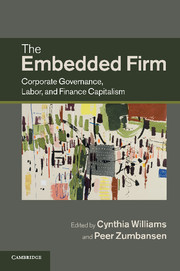Book contents
- Frontmatter
- Contents
- Figures
- Tables
- Contributors
- 1 Introduction: corporate governance after the ‘end of history’
- Part I Historical trajectories of business and regulation
- 2 Corporate governance and financial crisis in the long run
- 3 Financialism
- 4 Legitimating power
- 5 Engaging corporate boards
- 6 The primacy of Delaware and the embeddedness of the firm
- 7 The new embeddedness of the corporation
- Part II New interests, new shareholder constellations, new landscapes
- Part III Labor’s evolution in the new economy
- Part IV The transnational embedded firm and the financial crisis
- Part V Conclusion
- Index
- References
7 - The new embeddedness of the corporation
corporate social responsibility in the knowledge society
from Part I - Historical trajectories of business and regulation
Published online by Cambridge University Press: 07 September 2011
- Frontmatter
- Contents
- Figures
- Tables
- Contributors
- 1 Introduction: corporate governance after the ‘end of history’
- Part I Historical trajectories of business and regulation
- 2 Corporate governance and financial crisis in the long run
- 3 Financialism
- 4 Legitimating power
- 5 Engaging corporate boards
- 6 The primacy of Delaware and the embeddedness of the firm
- 7 The new embeddedness of the corporation
- Part II New interests, new shareholder constellations, new landscapes
- Part III Labor’s evolution in the new economy
- Part IV The transnational embedded firm and the financial crisis
- Part V Conclusion
- Index
- References
Summary
Introduction
Reflections on corporate social responsibility (CSR) in the midst of a financial crisis are likely to have several starting and turning points. The current instabilities of the financial markets dramatically put into perspective the almost religious wars fought over the last twenty years between shareholder value proponents and stakeholder capitalism defenders, carried out as a dispute over global convergence or divergence of corporate governance standards. The expansion of global corporate finance, particularly since the collapse of communism, dramatically changed our perspective on the business corporation, from industrial, embedded capitalism to financial capitalism. This change in perspective tells a story about the way in which we attribute different categories of responsibilities to the business corporation. While we are seemingly well acquainted with the ‘classical’ segments of that story, its continuation is anything but clear. The history of corporate social responsibility as an ideal, concept, dream, ideology or illusion is as intertwined in the larger political economy of capitalist developmentas it has a particular idiosyncratic history of its own. The following observations aim at illustrating this history with reference to three larger paradigms regarding the theory of the business corporation – and associated theories of corporate (social) responsibilities.
This chapter proposes to reflect on the history and on the prospects of CSR through the study of its evolution by focusing on three paradigms: the organizational–industrial paradigm of the corporation, which evolved over the first seventy-five years of the twentieth century, views the corporation as an object for competing concepts of market intervention, for both conflicts over the appropriate role of business enterprises and for the scope of legal regulation of business in the context of Keynesian economics and welfare statism. Within the first paradigm, the relevance of contested ‘social responsibilities’ of the business corporation can only be understood when seen against the larger background of a radically unfolding market economy, a critique of formal law and a deep-reaching deconstruction of political, legal and economic power. For corporate law, this phase is marked by heated normative debates over the social status of business corporations, which centred around ideological disputes over the ‘public’ or ‘private’ nature of the corporation.
- Type
- Chapter
- Information
- The Embedded FirmCorporate Governance, Labor, and Finance Capitalism, pp. 119 - 148Publisher: Cambridge University PressPrint publication year: 2011
References
- 2
- Cited by



